The truth is: it’s damned difficult to find a clear, definitive answer.
Check out our definitive ultimate guide to foundation repair.
Average Foundation Repair CostFoundation Repair cost varies greatly and is dependent upon underpinning repair type (push pier, helical pier, mudjacking, polyurethane deep injection, stabilization, and/or lift) with an average national cost of $24,000 to $60,000. |
While a few well-established sites, such as Home Advisor and Angie’s List, have taken a commendable crack at nailing down a rough cost estimate, these numbers are not exact.
They are not a zeroed-in representation of foundation repair costs on the Left Coast, especially here in Southern California.
Here at Dalinghaus, we cut the bull. We offer well-researched, clear, and concise step-by-step explanations for cost, efficacy, and warranty.
The cost of your foundation repair is contingent on three primary factors:
- The Area of the Project
- The Type of Repair
- The Permits & Engineering
The average foundation repair cost in Southern California is around $24,000.
Before we dive in – are you sure you even need foundation repair? On many foundation repair inspections, our foundation repair specialists determine there is no foundation damage. To book a free foundation inspection, click the button below.
The Area of the Project
The single biggest factor in determining your foundation repair cost is area. We’re not talking in strictly mathematical terms (in such that Length x Breadth = A or whatever), but in terms of size/scope.
It is important to note that the size of your home is not the key determining factor of price; but, rather, the size of the affected area. For example, you may only require a lift for a small section of your home, resulting in a significant cost reduction compared to an entire house project.
The affected area is determined by a floor elevation survey.
If your home does have foundation issues, the floor elevation survey is sure to find them. In addition, there are pretty substantial signs and symptoms to look for when assessing a foundation’s health.
If you do not receive floor elevation readings from the company providing your foundation repair quote – ask for them.
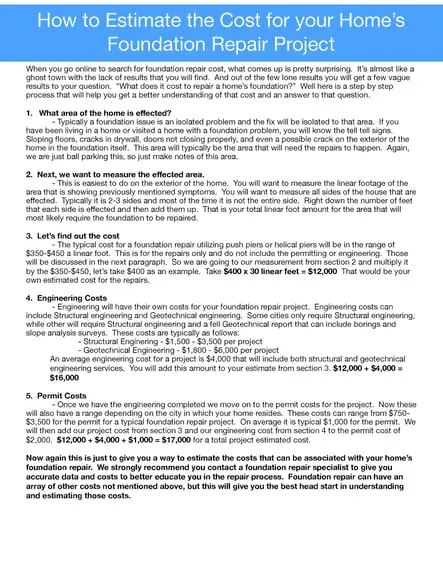
A floor elevation survey provides you with useful information and helps you better understand the severity of your home’s foundational problem.
Also, this survey helps validate the recommended repairs and helps ensure you aren’t being bamboozled.
Ultimately, floor elevation surveys are a diagnostic tool that helps us determine:
- The best type of repair that fits your unique needs
- And, consequently, the correct equipment, tools, and labor necessary to complete said repair
The Type of Repair
So, floor elevation surveys help determine the most appropriate foundation repair type that fits your home’s unique requirements.
Here is an example of a floor elevation from Dalinghaus Construction.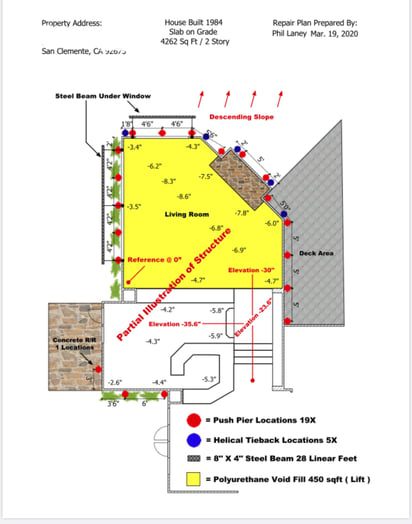
Type is the second biggest factor when it comes to foundation repair cost. Each type has its own unique pricing bracket.
Push Piers
Push Piers cost an average of $2,000 to $3,000 per pier in SoCal and Arizona.
An average home project utilizes x piers, you can do the math. Push piers are an average of 4 feet and fit together (a collar creating room for less skin-friction as the piers are forced into the earth).
The push piers are hydraulically pushed (yes, quite literally) into the ground until they reach competent, load-bearing soil.
You know those island documentaries where islanders chew betelnut and homes are built on stilts? Imagine that is your home, but the stilts are underground.
Helical Piers
Helical piers cost an average of $2,000 to $3,000 per pier in SoCal and Arizona.
Helical pier installation cost is determined by size, depth, and access.
The two different types of helical piers are 1). Round and (2. Square. Round helical piers are excellent for vertical or compression loading.
Square Shaft helicals work best for lateral or horizontal loading. Round or square, we know What Are the Best Helical Piers to Use.
These are similar to push piers; except they are screwed deep into the earth rather than pushed.
Helical piers prove quite versatile and can be utilized on almost any type of foundation.
Helical piers are an industry favorite for securing new construction sites to prevent future settlement.
Helical piers are a little more expensive than push piers primarily due to the heavy equipment required for installation.
Polyurethane Deep Injections
Polyurethane Deep Injection costs an average of $150 to $180 per square foot in SoCal and Arizona.
Polyurethane Deep Injection is utilized when a home has minimal settlement, and the owner is looking to stabilize the home in its current condition.
We drill nickel-sized holes into concrete, snake in our injector, and infuse the polyurethane foam to lift the slab by pressure.
These injections are most effective when a home has fallen less than 1” of settlement and the native soils are 10 or fewer inches from ground level.
This is typically the cheapest option, costing around ½ of push pier/helical pier repair price.
The Permits & Engineering
Foundation repair projects inherently require a variety of engineering needs and services.
These can range from simple structural repair recommendations to a full-blown structural set of plans with corresponding geotechnical reports (which require soil borings and slope analysis).
There is no one size fits all set of requirements when it comes to obtaining a permit for the foundation work to be performed.
Every city and county have their own unique and specific requirements.
In addition to these highly individualized engineering requirements, there is a wide range of costs associated with obtaining a permit.
A permit can range anywhere from $750 to $3,500 or more (depending on locale and the valuation of your project).
On top of possibly steep permitting fees, there are engineering fees to factor in. These can range anywhere from $1,000 to $3,500 for structural engineering and $1,800 to $6,000 for geotechnical engineering.
These prices reflect the amount of time, investigation, and services required to fulfill the city’s requirements.
We have our finger on the pulse of costs, requirements, and timelines for most cities in Southern California and Central Arizona. Feel free to reach out to us to get your city’s costs, requirements, and timelines.
Further Break Down
So, now that we have dissected the primary items that influence cost, let’s run through how to do a quick assessment of your home and begin to get a rough estimate for costs associated with fixing your home’s foundation.
Step 1 –
Diagnose the area that you notice the majority of your issues with (including sloping floor, sticky doors, etc.)
Measure the length along the exterior wall of the affected area (you will want to measure all sides of the house that are impacted). Typically, this will be 2-3 sides depending on your home’s settlement pattern.
Step 2 –
Determine linear footage.
Step 3 –
Multiply the linear footage by $350 to $450 to get a rough estimate for the repairs.
Step 4 –
Add engineering fees (an average of $5,000 for all engineering fees and permitting).
Step 5 (Optional) –
Stop swearing – it’s all gonna be okay.
This should give you a ballpark estimate of the costs for repairs.
Obviously, a foundation repair contractor (such as Dalinghaus Construction, Inc.), will be able to provide you with a much more accurate picture of data and costs, but this should at least point you in the right direction.
If you receive multiple bids, which we highly suggest you do, you need to know how to accurately compare and contrast them. For a rubric, read our article Foundation Repair Cost Comparison – Tips & Tricks.


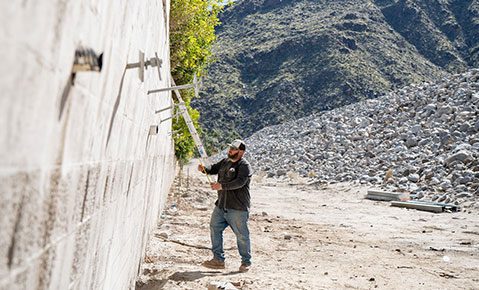
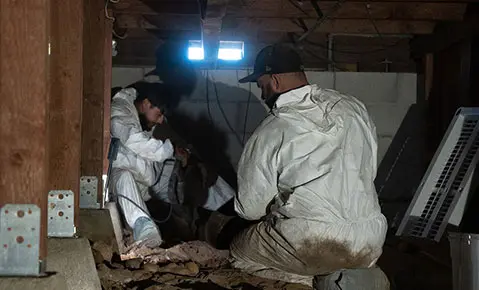
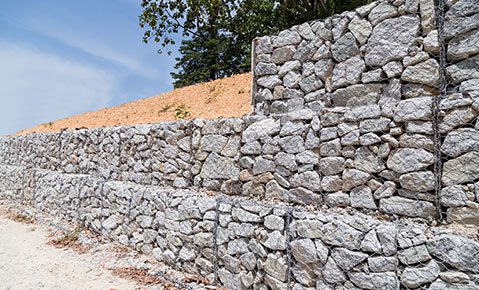
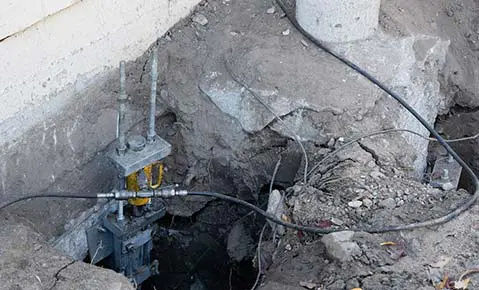
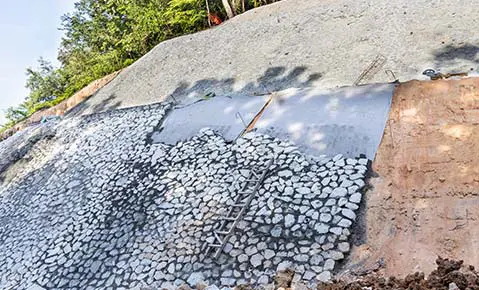
One Response
The information that you have shared is very informative if you could share more about foundation repair it will be top-notch. Thank you! for sharing this informative blog.